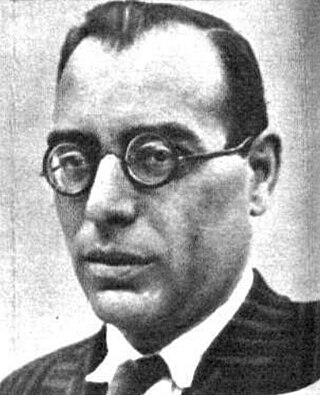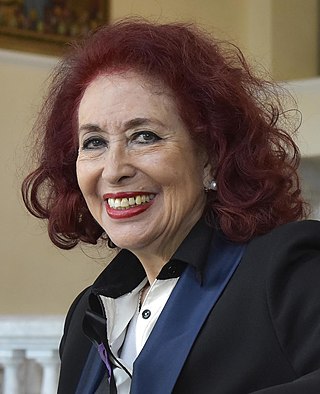Related Research Articles

"Las Trece Rosas" is the name given in Spain to a group of thirteen young women who were executed by a Francoist firing squad on 5 August 1939, just after the conclusion of the Spanish Civil War. Their execution was part of a massive execution campaign known as the "saca de agosto", which included 43 young men.

In Francoist Spain, at least two to three hundred concentration camps operated from 1936 until 1947, some permanent and many others temporary. The network of camps was an instrument of Franco's repression.
Alberto Assa was an Ottoman-born Colombian educator, translator and humanist of Sephardi descent.
Sixto Agudo González was a Spanish politician and World War II resistance member. His nom de guerre was 'Blanco'. He was married to Ángeles Blanco Brualla, the first Communist Party mayor in Aragón.

Joan Comorera i Soler was a Spanish Communist politician, journalist and writer from Catalonia who spent several years in Argentina before returning to Spain in 1931 at the start of the Second Spanish Republic. He was a Catalan nationalist, and was elected chairman of the Socialist Union of Catalonia in 1933. In 1936 he became Secretary General of the Unified Socialist Party of Catalonia (PSUC), in alliance with the Spanish Communist Party. During the Spanish Civil War (1936–1939) he built up his party into a major political force during the struggles among the supporters of the Republic between Socialists, Stalinists, Trotskyists and Anarcho-syndicalists. After the Republicans were defeated by the right-wing forces led by Francisco Franco he went into exile, living in Mexico and then in France. In 1949 he was expelled from the Communist party for his Catalan nationalism, and survived an assassination attempt. In 1951 he moved back to Catalonia using a false name. He was arrested in 1954 and died in prison four years later.
Carlota Alejandra Regina Micaela O'Neill y de Lamo was a Spanish writer and journalist. Her husband, Captain Virgilio Leret Ruiz, was executed after opposing the July 1936 military uprising in Melilla which led to the Civil War. She spent three years and nine months in prison and some years later went into Venezuela and Mexico. She also wrote under the pseudonyms Carlota Lionell and Laura de Noves.

Milicianas fought in the Spanish Civil War. They came from a culture with iconic fighters, and where women had been recently empowered through direct political engagement in political organizations and labor unions. The Dictatorship of Primo de Rivera saw women take more to the streets to protest and riot, though their actions were dismissed by male political leaders. The creation of the Second Spanish Republic led to an environment encouraging active political participation in broader Spanish society, and ultimately served to assist many women in their decision to head to the front, as the Government expanded rights for women, including the right to vote, divorce, go to school and stand for election.
Women in the Communist Party of Spain were highly active, the most visible figure in the movement being Dolores Ibárruri, who joined in its early years. The Dictatorship of Primo de Rivera pushed the group underground, where they had to meet clandestinely around their public face, the football club Oriente FC.

Women in the Popular Front in the Spanish Civil War were part of a broad leftist coalition founded ahead of the 1936 Spanish general elections. The Second Spanish Republic represented a changing cultural and political landscape in which women's political organizations could flourish for the first time. It failed to empower women completely, as they were often locked out of governance roles and positions in political organizations. Many organizations continued to discriminate against women, as Marxist ideology did not see them as a unique group with special needs but as part of larger class grouping in which class equality needed to be prioritized.

Women prisoners in Francoist Spain were often there because of specific repression aimed at women. During the Civil War, many women were in prison because family members had Republican sympathies or the authorities wanted to lure out male Republican affiliated relatives; it was not a result of anything the women did themselves. The Law of Political Responsibilities, adopted on 13 February 1939, made such repression easier and was not formally removed from the Criminal Code until 1966. Prisoners and people in concentration camps, both male and female, would total over three quarters of a million by the end of the Spanish Civil War. Of these, 14,000 women were held in the Las Ventas Model prison in Madrid.
Women in Unión General de Trabajadores (UGT) in Francoist Spain played important roles in the union dating back to the Second Republic period, even as their specific needs like maternity leave, childcare provisions and equal pay were subverted for the improvement of better overall working conditions. Women UGT leaders in the Civil War period included María Lacrampe and Claudina García Perez.
Women in 1930s Francoist Spain experienced major changes to marriage. Civil marriages that took place between 1932 and 1939 were annulled, and only if both partners were Roman Catholic were they permitted to remarry.

Lidia Falcón O'Neill is a Spanish politician and writer. With a degree in law, dramatic art, and journalism, and a PhD in philosophy, she has stood out for her defense of feminism in Spain, especially during the Transition.
The 104th Mixed Brigade was a unit of the Spanish Republican Army created during the Spanish Civil War. Throughout the war it acted on the Extremadura, Aragon and Catalonia fronts.
María Lozano Hernández (1909–1940) was a Calé libertarian activist. She was one of the first women to be shot by the dictatorship of Francisco Franco.
Neus Bouza Gil (1916-1939) was a Catalan anarchist militiawoman, executed at the age of 22. She was one of the twelve women in the Les Corts prison who were shot in the Camp de la Bota by Franco's regime.
Clara Pueyo Jornet was a Spanish communist, member of the executive committee of the Unified Socialist Party of Catalonia (PSUC), and secretary of the International Red Aid. She was persecuted by Francoism, arrested, tortured, and imprisoned in the Les Corts prison in Barcelona, from where she staged a remarkable escape known as The Great Flight, organized by the Communist Party of Spain (PCE), after which she disappeared.
Soledad Real López (1917–2007) was a Catalan communist and anti-fascist activist.

Victòria Pujolar Amat was a Spanish Republican activist and member of the Unified Socialist Party of Catalonia. Subject to reprisals by Franco's regime, she suffered torture, imprisonment and exile. She lived in France, Czechoslovakia and Romania. She never gave up the political struggle and was the first voice in Catalan on the clandestine Radio España Independiente, popularly known as La Pirenaica, based in Bucharest. She was also a sportswoman and painter.
References
- 1 2 "Testimonios de mujeres en las cárceles franquistas, de Tomasa Cuevas (Huesca, Instituto de Estudios Altoaragoneses, 2004)" (PDF).
- 1 2 "Abarca Izquierdo, Adelaida · Censo de Represaliados de la UGT · Censo de Represaliados y Víctimas de la UGT". censorepresaliadosugt.es. Retrieved 2024-06-16.
- ↑ Fonseca, Carlos (2008). Trece Rosas Rojas- Capítol 4. Clandestinos (in Catalan). Madrid: Ediciones Temas de Hoy(T.H.). p. 316. ISBN 978-84-8460-528-7.
- ↑ Fonseca, Carlos (2008). Trece Rosas Rojas, Capítol 11: La Redada (in Catalan). Madrid: Ediciones Temas de Hoy (T.H.). p. 316. ISBN 978-84-8460-528-7.
- ↑ Hernández Holgado (2011). La Prisión Militante. Las cárceles de mujeres franquistas de Barcelona y Madrid (1939-1945) (Thesis) (in Catalan).
- ↑ Fonseca, Carlos (2008). Trece Rosas Rojas - Capítol 12 La Prisión de Ventas Pàg. 184 (in Catalan). Madrid: Ediciones Temas de Hoy (T.H.). p. 316. ISBN 978-84-8460-528-7.
- ↑ Subirats Piñana, Josep (2006). Les Oblates 1939-1941 Presó de dones de Tarragona Capítol: Ressò de "Las trece Rosas" (in Catalan). Valls (Tarragona): Cossetània edicions, Col·lecció el Tinter nº 67. p. 272. ISBN 978-84-97912-18-1.
- ↑ Plans i Campderrós, Lourdes (2006). Maria Bigordà Montmany, testimoni d'una època obscura (La Repressió). Terrassa: Centre Estudis Històrics. p. 96.
- ↑ Cuevas Gutiérrez, Tomasa (2005). Presas (Mujeres en las carceles franquistas) Capítol La fuga (testimoni d'Adelaida Abarca) (in Catalan) (7th ed.). Barcelona: Icaria, Editorial. p. 176. ISBN 9788474268300.
- ↑ Archivo Histórico, Partido Comunista de España (PCE) (14 May 1946). "Informe de Adelaida Abarca Izquierdo sobre las cárceles de Ventas, Gerona y las Corts". Informes del Interior, Sig. 195-196 AHPCE.
- ↑ López Raimundo, Gregorio (1996). "Josep Salas Vidilla, Un puntal del PSUC en la clandestinitat". Iniciativa i Treball nº 68.
- ↑ "Les hores i els dies: Josep Salas Vidilla". Les hores i els dies. 30 March 2016. Retrieved 2024-06-16.
- ↑ "Los cordeles de la dehesa: Visibles: Adelaida Abarca Izquierdo "La Deli"". Los cordeles de la dehesa. 19 August 2020. Retrieved 2024-06-16.